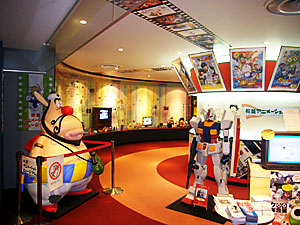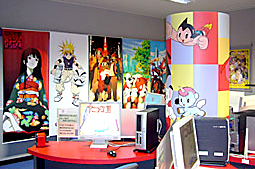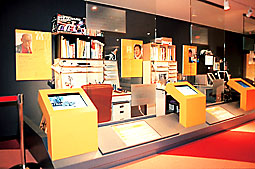 |
Here and There introduces art, artists, galleries and museums around Japan that non-Japanese readers and first-time visitors may find of particular interest. The writer claims no art expertise, just a subjective viewpoint acquired over many years' residence in Japan. |
|
|
 |
 |
 |
Suginami, the Anime Capital of
Japan
Alan
Gleason |
 |
 |
 |
 |
| Entrance
to the museum, with timeline in background |
 |
For the past seven years I've
been living in a neighborhood that is Japan's animation
capital. Who knew? Turns out that my ward, Suginami,
on the western edge of Tokyo, is regarded by those
in the know as the Mecca of anime. This is where
such legendary studios as Madhouse, Tokyo Movie
and Sunrise set up shop; today Suginami is still
home to over 70 of Japan's 400 animation companies.
No wonder, then, that the ward government saw fit
to open the Suginami Animation Museum in 2005. Occupying
two floors of the Suginami Hall building just off
the district's main artery, Ome-kaido, the museum
is actually run by the Association of Japanese Animations,
a consortium of animation companies, many of them
based, naturally, in Suginami.
When I made my pilgrimage there -- ten minutes by
bicycle -- one sultry midsummer weekday afternoon,
most of the visitors were either young mothers with
their little ones in tow (to see the special Pokemon
exhibit, no doubt), or middle-school boys staring
intently at monitors in the Anime Library room.
Though not exactly an anime otaku myself, there
is much that I admire about the medium (and what's
not to admire about Osamu Tezuka's or Hayao Miyazaki's
work?). Still, I wasn't entirely sure I'd find the
museum an enthralling place to spend an afternoon.
I was pleasantly surprised.
Start with the exhaustive timeline -- detailing
the triumphant postwar ascendance of Japan's animation
industry -- that fills an entire wall, accompanied
by vintage TV sets showing classics from each decade.
Move on to the series of video screens that explain
the complex and fascinating process of creating
an animation. (Did you know that 1,440 cels have
to be drawn for every minute of footage? That's
129,600 for a 90-minute feature.) The subtitles,
incidentally, are among the best English translations
I've seen in any museum in Japan.
Then there are the displays of technologies of animation
past (zoetropes, praxinoscopes, thaumatropes) and
future (LCD tablets, motion capture, 3D). Finally,
there is the Digital Workshop, where budding animators
can try their hand at manipulating, sequencing and
editing images of their favorite characters.
Though Miyazaki's Ghibli Museum down the road in
Mitaka may draw bigger crowds, the Suginami Animation
Museum is the only venue in the country that features
works spanning the entire industry. With something
for kids of all ages, it is a museum that does my
'hood proud.
 |
|
 |
|
|
|
| The
Digital Workshop room |
|
"How
Anime is Made" video display |
All images courtesy of
the Suginami Animation Museum
|
|
 |
|
|
 |
Suginami
Animation Museum |
 |
http://www.sam.or.jp |
 |
Suginami
Kaikan, 3-29-5 Kamiogi, Suginami-ku, Tokyo
Phone: 03-3396-1510 |
|
Open
daily 10-6 (closed Mondays and 28 December - 4 January)
Transportation: 15 minutes walk from the north exit
of JR Ogikubo station on the Chuo Line, or 5 minutes
by bus (get off at Ogikubo Keisatsusho-mae bus stop) |
 |
|
 |
 |
Alan Gleason
Alan Gleason is a translator, editor and writer based in Tokyo, where he has lived for 22 years. In addition to writing about the Japanese art scene he has edited and translated works on Japanese theater (from kabuki to the avant-garde) and music (both traditional and contemporary). |
|
|
|
 |
|